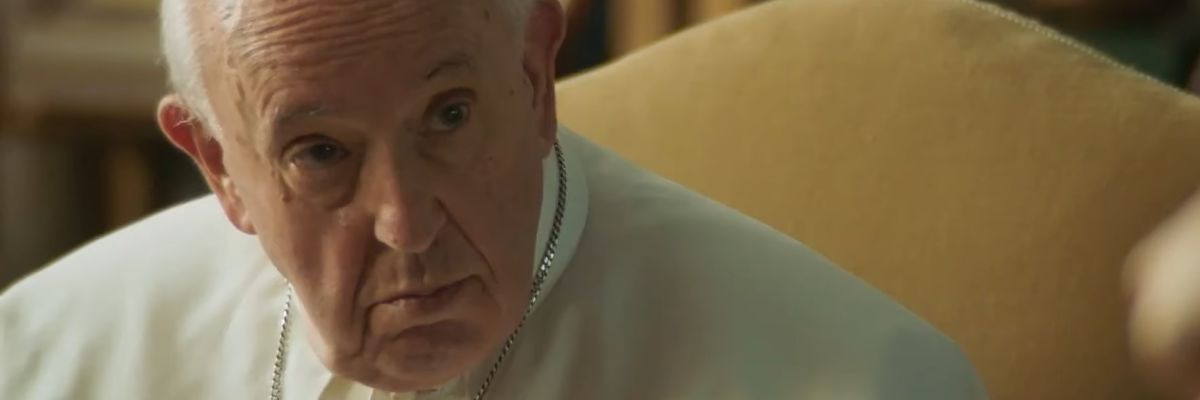
The pope, an atheist, a Muslim, a transgender, an abortion activist, and a pornographer walk onto a Disney set during Holy Week . . .
No, that’s not the first line of a bad bar joke, but the premise of a documentary called The Pope: Answers, which premiered last week on Disney-owned Hulu. Co-directed by Spaniard Jordi Évole, whose past work includes a muckraking attack on Opus Dei, it promised a no-topics-barred rap session between Pope Francis and a diverse group of young people seemingly chosen to represent every possible anti-Catholic grievance.
Since plans for the film were announced, some Catholics had been expecting a train wreck. Historically, the combination of skeptical journalists and Pope Francis speaking ex tempore has produced reactions from the faithful ranging from head-scratching to face-palming. Given the setup here, and a timeline for release that was at best ill chosen and at worst crassly calculated to disrupt the Church’s focus during its most solemn and prayerful days, many were expecting controversy to rival the optics of Francis’s most notorious in-flight press conferences or unrecorded interviews.
Based on the headlines from early reviews, the film did its best to ruffle feathers. An Argentinian woman who identified herself as both a catechist and an abortion activist presented the pope with a green scarf bearing a pro-abortion slogan—symbol of the recent successful movement to legalize abortion in the pope’s home country—and he accepted it (before, as the headlines leave out, unambiguously upholding Church teaching on abortion). Persons identifying along various points of the “LGBTQ+” spectrum demanded more sexual diversity in the Church. And a Colombian woman defended her work making pornography because—can’t make this up—it allows her to spend more time at home with her family.
But two other moments in the film have come under the most scrutiny.
The one that made most of the headlines was when the pope was asked about the online hookup site Tinder. He responded that it was “normal,” because young people “have that eagerness to meet each other.” POPE SAYS TINDER IS ”NORMAL”!
But I’m not inclined to join the chorus of critics for this one. First, because Pope Francis probably doesn’t know what Tinder is, in the way that your grandmother probably doesn’t. He may think it’s an ordinary online dating site rather than a digital meat market (indeed, it was described to him in the question as “a place where young people meet”). And second, because even if he does know what Tinder is, surely the meaning of his response was not to endorse swiping your phone for sex partners, but to establish a baseline shared principle that the attraction between sexes is normal and good. (Whether that’s a point that even needs to be stipulated today is its own fair question.)
The other and much more bothersome headline-maker was when the pope remarked that the Church’s “catechesis on sex is still in diapers.” I found this unfortunate, for three reasons.
First, because it’s a belittling image. Babies wear diapers—and poop in them. Diapers are for people who don’t have intelligence or control over their faculties. Even if the pope just intended to express a lack of development in the Church’s sexual teaching, the metaphor does more—it invites an unserious attitude, even ridicule, toward that teaching.
Moreover, because the Church’s catechesis on sex is not in its infancy, as if Scripture and the Fathers and the Doctors and popes and theologians haven’t been teaching about sexual morality for two millennia. As if Francis’s recent predecessor John Paul II had not profoundly reaffirmed and synthesized and advanced the Church’s wisdom on the subject. As if the JPII generation has not seen a flowering of sex-positive chastity ministry, responding, as the Holy Spirit always does, to the challenges of the age.
Even beyond these points of fact, there is a dangerous underlying premise to this “diapers” business: the idea that, even after nearly 2,000 years, the Church still has only a baby’s understanding of what will make human beings flourish and lead them to salvation, and what will make them miserable and lead them to hell.
Yes, doctrine develops. The Church’s reflection on the revealed mysteries deepens and ripens; throughout history, definitions and precisions are made to counteract errors. But incremental and organic development of doctrine doesn’t sever Church teaching from its roots. The Church cannot endorse as good today the same moral acts that it expressly forbade to Christians of the past. Conversely, it can’t say, “Sorry for those past long centuries where we taught that such-and-such a practice was good and salvific; but all that time, our teaching was just in diapers. Now we know that the opposite is true. Tough luck, you guys who listened to us back then.”
Either thing would be monstrous. If we were forced to adopt such a freakishly protracted view of doctrinal development that even 2,000 years isn’t enough to settle on solid and reliable moral guidance on basic, universal questions, it would leave all Catholics in a perpetual cloud of unknowing over how and how not to live.
You might also say that it would invalidate the Church’s core claims. Sheldon Vanauken, the twentieth-century Anglo-Catholic convert who wrote the beloved memoir A Severe Mercy, once offered an argument that he formulated as “Women’s ordination denies the Incarnation.” He reasoned that if the Church were to start ordaining women after twenty centuries of saying it couldn’t, that would represent a) such a great injustice to the women of those twenty centuries, and b) such an admission of fallibility on a central aspect of the Faith, that the Church could not possibly call itself a reliable steward of divine truth. And since Christ founded the Church to be just that, his own divine authority would fall apart.
Likewise, if we believed that, after twenty-one or twenty-three or thirty centuries, our Church could grow out of its “diapers” and start blessing sexual behaviors that it had consistently called gravely evil, it would be impossible to continue crediting the Church’s claim to being an authoritative teacher of gospel truth.
But such a reversal of teaching is just what some in the Church hope for, even expect. It seems to be what Fr. James Martin expects when he tells a man that one day he’ll be able to kiss his “husband” in church. It seems to be what the architects of the German Synodal Way, expressly calling for such reversals, expect.
I don’t think this is what the Holy Father wants or expects. But most of the young people gathered around him for The Pope: Answers, along with millions of other Catholics around the world who think the same way, plus countless others monitoring Rome for signs of change, do want and expect it. And I fear that the kind of language he chose in answering them, despite his good intention to thread the needle of accompaniment between discouragement and false hope, tends to lead such people not toward conversion, but to self-assurance that one day, a fully “mature” sexual catechesis will just affirm the way they’ve been living all along. Then they’ll be motivated to wait it out, not to change their lives.
I think we might take this as a caution, when we’re involved in defending and explaining the Faith, not even to give the appearance of being coy or apologetic about the hard teachings. Even when this is not our intention, the other party may choose to hear it that way. They may also find the object of your evangelization much less compelling. Who, seeking perennial wisdom and the full armor of God, would settle for a diaper?



